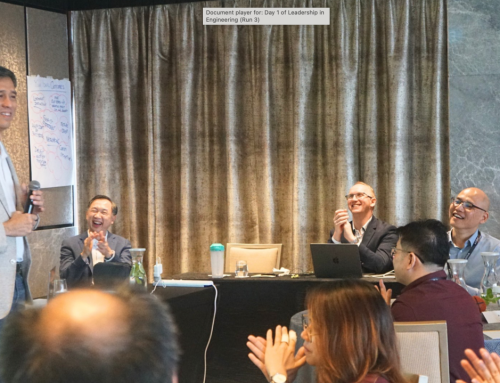Our son, Kieran, 17 years old, came to me only 6 months ago and asked me that exact question. “Hey Papa, if you could have done anything when you were younger that would have helped you, like a skill or something, what would you have done?”
Wow, this boy teaches me so much about myself. The gifts he shares without even knowing really comes from the appreciation of those conversations when he allows them to happen. And no matter what is happening in my world (because being a teenage boy, thing do tend to happen on his terms), I will put down my tools and give him my undivided attention.
I’m fully aware that these conversations are wonderful opportunities to not only connect with him, but also opportunities for me to reflect within myself.
“You know what, Kieran, I wish my younger self had experienced even more rejection and learned how to effectively communicate even better.
I would have taken up a sales role, door-to-door something along those lines, where I would have heard the word NO continuously. I would have appreciated my self-worth so as to not take things so personally, AND have the RESILIENCE to continue even when the door kept closing in my face.”
Making A Case When You Communicate
I want you to bear in mind that as with most human beings, this boy does not like to be told what to do and resists anything he feels is being pressed upon him. So much like all I do in my role as a coach and a mentor, I enjoy telling stories that he can relate to.
I’m sure, by now, you’ve heard about how storytelling can make a huge difference in your corporate communications—but it’s also one of the best ways for you to communicate with your employees. And there are several reasons for this, other than how people have loved stories from the time they were painting on cave walls and it’s been instinctive in us ever since.
For one thing, storytelling breaks the ice, or breaks down the walls, especially in larger, top-down organisations where it can get kind of hard to approach (let alone talk to) the higher-ups. Telling stories your people can relate to, humanises you and makes them feel like you’re someone who would understand if they spoke to you about the issue at hand.
For another, storytelling illustrates or reinforces the message you’re trying to get across. Everyone knows how something is so much easier to understand when there’s a demonstration, and few things demonstrate something as clearly as a well-told story. After all, that’s how Aesop and the Brothers Grimm got the morals of their stories across, right?
Check out this conversation I had with our chief transformer and co-founder at EQ Strategist, Dominic Siow about having “courageous conversations”:
.
Notice the seamless way he worked in a story about something that happened to him at one of the organisations he used to work at. I’m pretty sure having a scary conversation with your boss is something a lot of us can relate to.
Do note, however, that if you’re going to tell stories to your people as a way to become a better communicator, make sure the stories are more or less related to the point you ultimately want to make. There are speakers, sometimes who’ll tell a funny story, which will make people laugh, for sure, but may not do very much in terms of driving the point home.
In any case, the final seed I planted during that conversation with Kieran was, “Imagine how much easier it would be to talk to girls if you were so good at handling rejection and hearing the word NO”. This was a subtle, yet important part of my “sell” to such a young, impressionable and curious mind.
Remember when I said how Kieran—and pretty much anyone—didn’t like being told what to do? A final benefit of telling stories in this context is helping to take the edge off of what might be construed as telling someone how they should act, think, or even feel in a certain situation. Stories tell them, but in a subtle way.
Seeds You Sow During Communication Can Bear Fruit
Allow me to share a very proud parent moment. While waiting in anticipation to see if he had been accepted into Business and Entrepreneurship at Polytechnic, he made the decision to start applying for some jobs in the interim, knowing he was just “killing time” at home.
During his first round of interviews, he asked if I would drive him to give him a “pep talk” on the way. He did exceptionally well and they said, “don’t call us, we’ll call you”. Kieran ignored the advice and called the next day to follow up. He passed the first test and he got the job.
This courageous and vulnerable young man is now knocking door to door collecting and raising monies for a wonderful charity here in Singapore. He spends 12-14 hour days hearing the word NO, changing his approach, learning and reading about the skills of building rapport, and so on—all contributing to developing himself as a wonderful human being.
I cannot yet even begin to appreciate what this experience will allow him to see. Yet I know and trust that the experience is unfolding for him, allowing him to learn so many skills and wisdom which will help him see his place in the world.
Leaders do need to take on the role of coach and mentor for their people, and as you can see, what you say to them in those personas can be a real turning point in their professional and personal development.
I would love to hear your stories of similarly inspiring parent moments so I may learn from you, but I would also love to hear:
- What are the key skills, lessons or experiences you would give to your younger self that would have served you in your life today?
- What skills have you learned that you truly appreciate as those that allow you to be the incredible leader you are?
You can tell me all about it, or ask us about becoming a better leader and communicator when you get in touch with us at EQ Strategist, today.
Thank you so much for reading.
Andrew Davey
If you have any enquiries, please send us a message.







